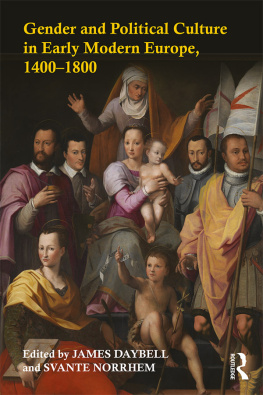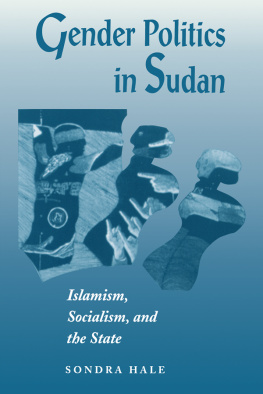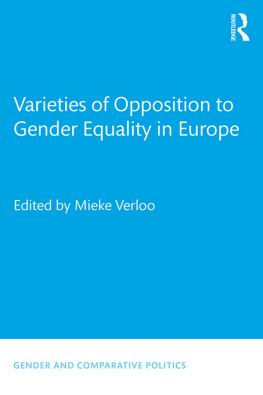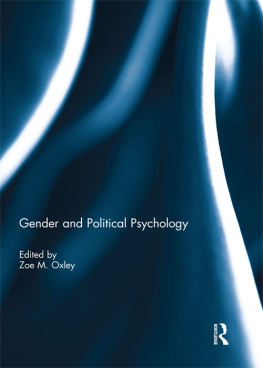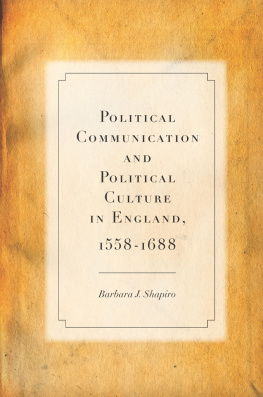Gender and Political Culture in Early Modern Europe, 14001800
Gender and Political Culture in Early Modern Europe, 14001800 investigates the gendered nature of political culture across early modern Europe by exploring the relationship between gender, power, and political authority and influence. This collection offers a rethinking of what constituted politics and a reconsideration of how men and women operated as part of political culture. It demonstrates how underlying structures could enable or constrain political action, and how political power and influence could be exercised through social and cultural practices.
The book is divided into four parts diplomacy, gifts and the politics of exchange; socio-economic structures; women and gendered politics at court; and voting and political representations each of which looks at a series of interrelated themes exploring the ways in which political culture is inflected by questions of gender. In addition to examples drawn from across Europe, including Austria, the Dutch Republic, the Italian States and Scandinavia, the volume also takes a transnational comparative approach, crossing national borders, while the concluding chapter, by Merry Wiesner-Hanks, offers a global perspective on the field and encourages comparative analysis both chronologically and geographically.
As the first collection to draw together early modern gender and political culture, this book is the perfect starting point for students exploring this fascinating topic.
James Daybell is Professor of Early Modern British History at Plymouth University. His previous publications include The Material Letter in Early Modern England: Manuscript Letters and the Culture and Practices of Letter-Writing, 15121635 (2012) and (as editor) Women and Politics in Early Modern England, 14501700 (2004).
Svante Norrhem is Associate Professor of History at Lund University. His previous publications include Flattering alliances: Scandinavia, diplomacy and the AustrianFrench balance of power, 16481740 (with Peter Lindstrm).
First published 2017
by Routledge
2 Park Square, Milton Park, Abingdon, Oxon OX14 4RN
and by Routledge
711 Third Avenue, New York, NY 10017
Routledge is an imprint of the Taylor & Francis Group, an informa business
2017 James Daybell and Svante Norrhem for selection and editorial matter, individual contributions the contributors
The right of the editors to be identified as the authors of the editorial material, and of the authors for their individual chapters, has been asserted in accordance with sections 77 and 78 of the Copyright, Designs and Patents Act 1988.
All rights reserved. No part of this book may be reprinted or reproduced or utilised in any form or by any electronic, mechanical, or other means, now known or hereafter invented, including photocopying and recording, or in any information storage or retrieval system, without permission in writing from the publishers.
Trademark notice: Product or corporate names may be trademarks or registered trademarks, and are used only for identification and explanation without intent to infringe.
British Library Cataloguing-in-Publication Data
A catalogue record for this book is available from the British Library
Library of Congress Cataloging-in-Publication Data
Names: Daybell, James, 1972- editor of compilation. | Norrhem, Svante,
1962 editor of compilation.
Title: Gender and political culture in early modern Europe, 14001800 /
edited by James Daybell and Svante Norrhem.
Description: London ; New York : Routledge, 2016. | Includes
bibliographical references and index.
Identifiers: LCCN 2016003990 | ISBN 9781138667419 (hardback :
alkaline paper) | ISBN 9781138667426 (paperback : alkaline paper) |
ISBN 9781315542188 (ebook)
Subjects: LCSH: Sex rolePolitical aspectsEuropeHistoryTo
1500. | Sex rolePolitical aspectsEuropeHistory16th century. |
Sex rolePolitical aspectsEuropeHistory17th century. |
Political cultureEuropeHistory. | Power (Social sciences)Europe
History. | AuthoritySocial aspectsEuropeHistory. | MenPolitical
activityEuropeHistory. | WomenPolitical activityEurope
History. | EuropePolitics and government. | EuropeSocial conditions.
Classification: LCC HQ1075.5.E85 G445 2016 | DDC
305.309409/024dc23
LC record available at https://lccn.loc.gov/2016003990
ISBN: 978-1-138-66741-9 (hbk)
ISBN: 978-1-138-66742-6 (pbk)
ISBN: 978-1-315-54218-8 (ebk)
Typeset in Bembo
by Apex CoVantage, LLC
Contents
James Daybell and Svante Norrhem
James Daybell
Part I
Diplomacy, gifts and the politics of exchange
Susan Broomhall and Jacqueline Van Gent
Peter Lindstrm and Svante Norrhem
Part II
Socio-economic structures, gender and politics
Randi Bjrshol Wrdahl
Barbara Harris
Elise Dermineur
Part III
Women and gendered politics at court
Victoria Smith
Sarah Bercusson
Part IV
Voting and political representation
Elaine Chalus
Peter Lindstrm, Hilde Sandvik, and sa Karlsson Sjgren
Conclusion
Global perspectives
Merry Wiesner-Hanks
Sarah Bercusson is an independent scholar living in San Francisco California. She was a lecturer in history at York St John University from 2010 to 2014 before leaving to join her husband in the USA. Dr. Bercusson completed her PhD in Italian Renaissance History and Material Culture at Queen Mary College, University of London in 2009. Her doctoral dissertation focused on the activities of three Habsburg Archduchesses, Eleonora, Giovanna and Barbara, who married into the Gonzaga, Medici and Este families, respectively, in the second half of the sixteenth century. Her comparative essay, The Duchess Court in Sixteenth-Century Italy, appeared in Moving Elites, edited by Giulia Calvi and Isabelle Chabot (2010). She has written on fashion and dress in Florence: Giovanna dAustria and the Art of Appearances: Textiles and Dress at the Florentine Court (Renaissance Studies, 2014) and she is the author of a chapter: Joanna of Austria and the Negotiation of Power and Identity at the Florentine Court in Medici Women: The Making of a Dynasty in Grand Ducal Tuscany (Toronto: Centre for Reformation and Renaissance Studies, 2015), edited by Giovanna Benadusi and Judith C. Brown. Her current research focusses on the networks and strategies of groups of elite women, in particular female members of ruling dynasties, in the Italian courts of the mid sixteenth century.
Susan Broomhall is Professor of Early Modern History at The University of Western Australia and a Fellow of the Australian Academy of the Humanities. She is author of a series of studies of women and gender in early modern France and the Low Countries, including most recently (with Jennifer Spinks) Early Modern Women in the Low Countries: Feminising Sources and Interpretations of the Past (Ashgate, 2011) and, as editor, Gender and Emotions in Medieval and Early Modern Europe: Destroying Order, Structuring Disorder (Ashgate, 2015) and Authority, Gender and Emotions in Late Medieval and Early Modern England

